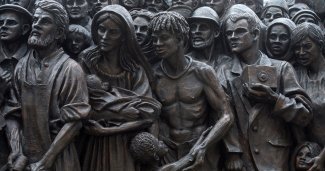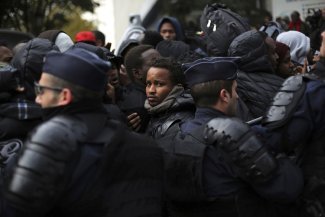This photograph taken on 9 March 2023, shows a view of a bamboo cross with a rosary, set as a memorial on a beach near Cutro, with the Mediterranean Sea in the background, where at least 72 migrants died on 26 February, after their boat sank off Italy’s southern Calabria region.
The boats keep coming.
Despite the deterrent of increasingly stringent border security laws, the criminalisation of solidarity, illegal and violent pushbacks, and the mounting number of deaths at sea, ‘illegal’ migration to Europe shows no signs of abating. This is in part because we misjudge the desperation that pushes people out of their countries in search of safety and opportunity. It is also because we take the concept of illegality for granted.
Far-right and conservative discourses have framed ‘illegal’ border crossings as a security issue – clandestine, risky, criminal – when in fact illegality is a phenomenon that is produced by Europe’s broken legal migration system, rooted in a deep and unfounded suspicion of certain migrants.
The International Organization for Migration (IOM) has documented almost 2,000 migrant deaths in the Mediterranean this year. Many of these deaths have been linked to delays in state-led rescue efforts and, in some cases, the absence of any rescue mission at all.
For example, on 14 June, in what the EU Commissioner for Home Affairs described as possibly “the worst ever tragedy we’ve seen in the Mediterranean”, a fishing trawler carrying an estimated 750 migrants sank off the coast of Greece, leaving just a handful of survivors. According to the official account of the Greek Coast Guard, the boat had refused help, but an investigation carried out by the BBC has disputed the official account of the catastrophe, claiming the boat was inactive for over seven hours before it sank.
In the wake of so many preventable migrant deaths, Italy has declared a state of emergency; not to review the deadly consequences of its border enforcement policies, but to speed up deportations, raise criminal penalties against migrant smugglers, and block rescue missions led by civil society and rights groups operating in the Mediterranean.
Italian Prime Minister Giorgia Meloni and her cabinet members – who are allies of far-right, autocratic and conservative governments all over Europe – have vowed to block rescue missions led by civil society and rights groups operating in the Mediterranean. Instead, they have framed migration from the Global South as mostly composed of potentially violent men from incompatible cultural backgrounds. They have also promoted the ‘great replacement theory’ which claims that there’s a global conspiracy to replace white people and dismantle their cultures through migrant ‘invasions’. In Hungary, this conspiracy theory is now state ideology.
The result has been devastating. Shahida Raza – a celebrated Pakistani football and hockey player, a member of the much-persecuted Hazara community and mother to a four-year-old with severe disabilities – is just one of the thousands of migrants who has drowned in an attempt to reach Europe this year.
Raza died in stormy conditions around 150 metres from the Italian coast in March. According to her friends and family, Raza left Pakistan to seek opportunities, safety and better treatment for her child. Her story, like the stories of the dozens who perished with her, does not fit the notion that irregular border crossings are mainly characterised by violent, criminal men who abuse the protections afforded to otherwise truly vulnerable and deserving people. Which begs the question: if those who brave the sea contain at least some truly vulnerable and desperate people, why don’t they have any alternate routes available to them?
The duty to protect all, not just those deemed ‘deserving’
The legal routes available to visitors and migrants are quite discriminatory with respect to the racial, social and economic profile of applicants. Countless studies have provided evidence of systematic racial discrimination in international visa policy-making.
In asylum cases, the threshold for what counts as persecution is so high and the suspicion around ‘bogus claims’ so intense, that asylum seekers are presumed to be lying before they have even made their claims.
As many journalists and scholars have discussed, asylum law as it is in Europe, has established a high bar of legitimacy and a hierarchy of suffering (sifting ‘refugees’ from ‘economic migrants’, for example) to judge the veracity of certain claims. This compels some asylum seekers to lie out of the fear that their real stories would not be perceived as powerful enough to gain the help and protection they may desperately need.
In turn, this stokes suspicions about claims, leading to more stringent policies, which in turn, compel migrants to make incredible claims because that is what the system tells them to do. As the British scholar of refugee law, James Souter, points out: migrants may lie due to the risk of return, rather than the absence of risk. However, Europe’s border regime – inadequate in adjudicating over the complex reality of persecution and suffering in various parts of the world – doesn’t take this into account. Instead, it frames seemingly incredible claims as both ‘untruthful and groundless’, the same way it treats illegal as immoral. These notions need to be decoupled, because it subordinates the duty to protect to the perceived character of the applicant.
Skewed perceptions of people’s vulnerabilities and challenges are not only evident in the arbitrary and callous ways in which we distinguish refugees from ‘economic migrants’ but also in the way we designate one group of refugees more worthy of help than others.
Think of the open-door, open-arms policy of welcoming Ukrainian refugees and compare that to the deep culture of suspicion that pervades asylum policy for Syrian or Sudanese people.
In Italy, Meloni and Matteo Salvini – deputy prime minister and head of the far-right League Party – have both been quick to portray Ukrainian refugees as more deserving than their Global South counterparts. According to Salvini: “We are welcoming 150,000 children and women from Ukraine. These are real refugees fleeing a real war, quite different from those landing by the thousands on the coasts of Calabria, Puglia and Sicily with their cell phones and tennis shoes.”
In the UK, anti-immigration rhetoric is also a mainstay of mainstream politics. One of Prime Minister Rishi Sunak’s main priorities is to stop small boats. Under his direction, the UK is ramping up detention and swiftly removing asylum seekers to ‘safe countries’ such as Rwanda - a contested policy, criticised for disregarding international refugee law. At the same time, his government has opened up safe routes for Ukrainian refugees.
Sunak’s Conservative party does not see this as a contradiction or double standard. In May, when the BBC asked the UK Home Secretary Suella Braverman whether the government would set up routes for Sudanese asylum seekers following the outbreak of armed conflict in April – the sort they put in place for Ukrainians last year – Braverman claimed the situation was “very different” because of the “longer-term implications’’ of the conflict. She also lent her support to the immigration minister, Robert Jenrick, who has claimed that uncontrolled migration could ‘cannibalise’ the compassion of the British people. According to Braverman, “we’ve got people who are coming here illegally. That in itself is criminal behaviour.” But why are Ukrainian refugees allowed ‘legal’ routes, while Sudanese refugees are illegalised?
27,000 drowned: a horrifying tally
Europe tells migrants to respect its border; to respect its laws, but it flouts its own laws when it comes to enforcing the border. Illegal and violent pushbacks of migrants have become a common institutional practice in the European Union, depriving migrants of the rights enshrined in European laws. Meanwhile, the human cost of such policies has produced a horrifying tally: almost 27,000 people have drowned in the Mediterranean since 2014. The shady deals with ‘safe transit countries’ to nip irregular movement in the bud have resulted in the emergence of migrant slave markets in Libya. The policy of illegal pushbacks has led to massacres such as the one in Melilla in June 2022 when a group of African asylum seekers attempted to cross from Morocco into the Spanish enclave and were met with deadly violence by security forces, leaving between 23 and 37 people dead. No one has ever been held accountable for these deaths.
The West keeps shifting the blame for these failures on smugglers and dodgy economic migrants but it is time it reckoned with its active role in shaping this murderous landscape. Discourses of illegality, security and legitimacy obscure the shortcomings of ‘legal’ immigration and the reasons why so many people in desperate conditions are left with no other option but to take illegal routes.
We know the boats will keep coming. With wars, climate disasters and global poverty, the boats will keep coming.
People like Shahida Raza will risk the sea because the ability to migrate is necessary for their well-being and survival. Faced with such a situation, it is important that we stop framing irregular or undocumented movement as an affront to our values or security, and instead see it as a process that brings into question our own beliefs about European borders and the values they represent. As professor of social philosophy at Free University Berlin, Robin Celikates, argues: irregular migration can be seen “as both a product of an illegitimate global border regime and as a form of political protest against it”.
It is time we started looking at the border crisis for what it really is: an ineffective and catastrophic failure of border enforcement policies rooted in Europe’s prejudicial attitudes towards migrants from the Global South. What we see in the figure of the irregular migrant is what Celikates calls a form of “political disobedience”, a challenge to global border regimes that has the potential to reconstitute the political community and “the very meaning of membership”.
So far, Europe has rebuffed this challenge with a brutal and resounding ‘no’. Doubling down on crude notions of illegality has done little else than criminalise certain migrants and normalise border violence. If anything, it is these discourses of legality and security that may have ‘cannibalised’ public empathy, portraying desperate migrants as criminals and dangerous people. More often than not, we only come to learn and appreciate their stories after our borders have sealed their tragic ends. There has to be a better way of treating people who come asking for our help.













